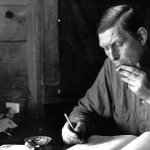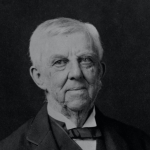As I came through the desert thus it was,
As I came through the desert: All was black,
A brooding hush without a stir or note,
The air so thick it clotted in my throat;
And thus for hours; then some enormous things
Swooped past with savage cries and clanking wings:
But I strode on austere;
As I came through the desert thus it was,
As I came through the desert: Eyes of fire
Glared at me throbbing with a starved desire;
The hoarse and heavy and carnivorous breath
Was hot upon me from deep jaws of death;
Sharp claws, swift talons, fleshless fingers cold
Plucked at me from the bushes, tried to hold:
But I strode on austere;
No hope could have no fear.
As I came through the desert thus it was,
As I came through the desert: Lo you, there,
That hillock burning with a brazen glare;
Those myriad dusky flames with points a-glow
Which writhed and hissed and darted to and fro;
A Sabbath of the Serpents, heaped pell-mell
For Devil's roll-call and some fête of Hell:
Yet I strode on austere;
No hope could have no fear.
As I came through the desert thus it was,
As I came through the desert: Meteors ran
And crossed their javelins on the black sky-span;
The zenith opened to a gulf of flame,
The dreadful thunderbolts jarred earth's fixed frame:
The ground all heaved in waves of fire that surged
And weltered round me sole there unsubmerged:
Yet I strode on austere;
No hope could have no fear.
As I came through the desert thus it was,
As I came through the desert: Air once more,
And I was close upon a wild sea-shore;
Enormous cliffs arose on either hand,
The deep tide thundered up a league-broad strand;
White foambelts seethed there, wan spray swept and flew;
And I strode on austere;
No hope could have no fear.
As I came through the desert thus it was,
As I came through the desert: On the left
The sun arose and crowned a broad crag-cleft;
There stopped and burned out black, except a rim,
A bleeding eyeless socket, red and dim;
Whereon the moon fell suddenly south-west,
And stood above the right-hand cliffs at rest:
Still I strode on austere;
No hope could have no fear.
As I came through the desert thus it was,
As I came through the desert: From the right
A shape came slowly with a ruddy light;
A woman with a red lamp in her hand,
Bareheaded and barefooted on that strand;
O desolation moving with such grace!
O anguish with such beauty in thy face.
I fell as on my bier,
Hope travailed with such fear.
As I came through the desert thus it was,
As I came through the desert: I was twain,
Two selves distinct that cannot join again;
One stood apart and knew but could not stir,
And watched the other stark in swoon and her;
And she came on, and never turned aside,
Between such sun and moon and roaring tide:
And as she came more near
My soul grew mad with fear.
As I came through the desert thus it was,
As I came through the desert: Hell is mild
And piteous matched with that accursèd wild;
A large black sign was on her breast that bowed,
A broad black band ran down her snow-white shroud;
That lamp she held was her own burning heart,
Whose blood-drops trickled step by step apart;
The mystery was clear;
Mad rage had swallowed fear.
As I came through the desert thus it was,
As I came through the desert: By the sea
She knelt and bent above that senseless me;
Those lamp-drops fell upon my white brow there,
She tried to cleanse them with her tears and hair;
She murmured words of pity, love, and woe,
She heeded not the level rushing flow:
And mad with rage and fear,
I stood stonebound so near.
As I came through the desert thus it was,
As I came through the desert: When the tide
Swept up to her there kneeling by my side,
She clasped that corpse-like me, and they were borne
Away, and this vile me was left forlorn;
I know the whole sea cannot quench that heart,
Or cleanse that brow, or wash those two apart:
They love; their doom is drear,
Yet they nor hope nor fear;
But I, what do I here?




















Comment form: